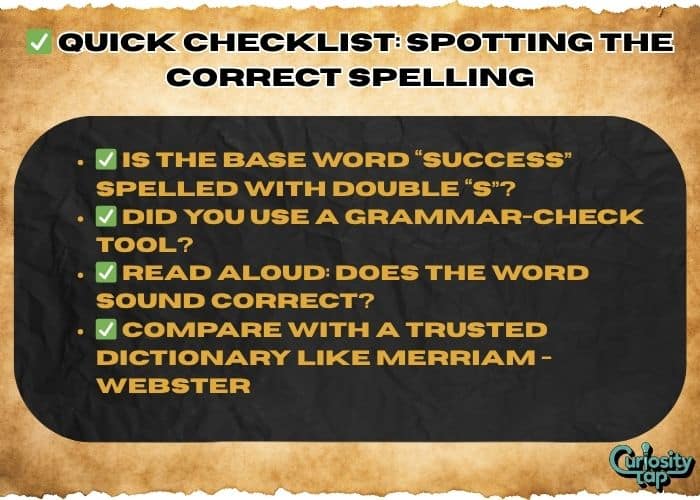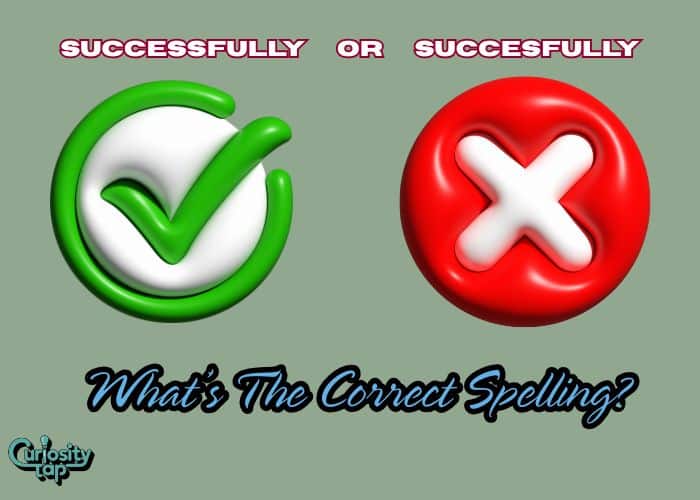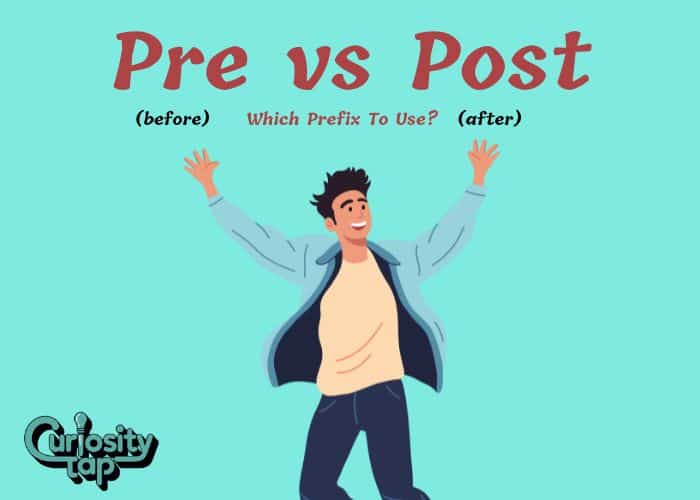Have you ever typed an important email or blog post and found yourself second-guessing whether it’s spelled “Succesfully” or “Successfully”? You’re not alone.
Misspelling words especially common ones can damage your credibility and confuse your audience. In this article, you’ll learn which version is correct, why it’s spelled that way, and how to never make this mistake again.
Let’s clear up the confusion once and for all.
✅ What’s the Correct Spelling?
The correct spelling is: Successfully
The word Successfully is the standard and grammatically correct form. The version “Succesfully” is a common misspelling caused by omitting one of the two “s” letters.
📌 Why is “Succesfully” incorrect?
- It drops a crucial “s” that comes from the base word “success.”
- There is no dictionary or language authority that recognizes “Succesfully” as a valid word.
Correct: I completed the project successfully.
Incorrect: I completed the project succesfully.
🧠 Breaking It Down: Word Origin and Structure
Etymology of “Successfully”
The word “successfully” comes from the noun “success,” which in turn comes from the Latin word successus, meaning “an advance, a good result.”
Word Formation
Success (noun) → Successful (adjective) → Successfully (adverb)
Each suffix adds a layer of meaning:
- -ful = full of
- -ly = how something is done
So, successfully means “in a way that achieves success.”
📚 Real-Life Example: When One Letter Changes Everything
Imagine this scenario:
Sara, a marketing executive, was applying for a promotion. She crafted a well-written email to her boss, summarizing her achievements. In the subject line, she wrote:
Subject: “Projects Succesfully Completed – Q2 Highlights”
Despite her strong record, her boss noticed the misspelling. It didn’t sink her promotion, but it did raise questions about attention to detail. Later, during the interview, the error was mentioned.
Moral of the story? In professional settings, spelling matters a single letter can change how you’re perceived.
✅ Quick Comparison Table
| Word | Correct? | Part of Speech | Meaning | Example |
|---|---|---|---|---|
| Successfully | ✅ Yes | Adverb | In a successful manner | She successfully launched her app. |
| Succesfully | ❌ No | — | Misspelled form | ❌ Avoid using this version |
📝 Common Mistakes and How to Avoid Them
❌ Dropping the Second “S”
Many users incorrectly assume only one “s” is needed after “c.” This usually happens due to pronunciation.
✅ Tip to Remember:
Think: “Success” has two S’s, so ‘successfully’ does too.
🧠 Use a Spell Checker or Grammar Tool
Modern tools like Grammarly or Microsoft Word will flag “succesfully” as a typo.

🛠️ Checklist: Proofread Like a Pro
Before hitting “send” or “publish,” check:
- ✅ Is the base word “success” spelled with double “s”?
- ✅ Did you use a grammar-check tool?
- ✅ Read aloud: Does the word sound correct?
- ✅ Compare with a trusted dictionary like Merriam-Webster.
FAQs (People Also Ask)
Is “Succesfully” ever accepted in British English?
No. Whether you’re following American or British English, “successfully” is the only correct spelling.
Why is “Successfully” often misspelled?
It’s mainly due to phonetic confusion and typing speed. The double “s” is easy to miss.
Can autocorrect fix “Succesfully”?
Usually, yes. Most devices will auto-correct it, but don’t rely on it blindly.
How do I teach kids to remember the correct form?
Use mnemonics like: “Double S means Success!” Visual repetition also helps.
Are there other words people misspell similarly?
Yes. Examples include:
- “Occasionally” (often typed as “ocasionally”)
- “Successfully” (mistyped as “succesfully”)
- “Accommodation” (often misspelled as “acommodation”)
Is “Successfull” correct?
No. The correct adjective is “successful” (with one “l” at the end).
✅ Pros & Cons of Using Spell Checkers
| Pros | Cons |
|---|---|
| ✅ Catches errors quickly | ❌ Might autocorrect to wrong words |
| ✅ Improves writing confidence | ❌ Doesn’t teach you long-term learning |
| ✅ Useful for non-native speakers | ❌ Can miss context-based errors |
🔚 Conclusion: Master Spelling, Gain Credibility
Choosing the correct spelling successfully might seem minor, but it plays a significant role in how others perceive your language skills, professionalism, and credibility. Don’t let a small typo undermine your message.
Take time to proofread, use tools, and remember: double “s” means success.
📢 Call to Action
Want to sharpen your English and write successfully every time?
👉 Check out our Grammar Checker Tool and never second-guess your spelling again!
👉 Read our guide on Common English Misspellings to boost your skills even further.
🔗 Sources
Sources:
- Merriam-Webster Dictionary. (n.d.). Successfully. https://www.merriam-webster.com/dictionary/successfully
- Grammarly. (2023). Commonly Misspelled Words. https://www.grammarly.com/blog/misspelled-words/
- Cambridge Dictionary. (2024). Success. https://dictionary.cambridge.org/dictionary/english/success
Read more knowledgeable blogs on Curiosity Tap
Is this article helpful?

Jackson Pearson is a passionate educator and language enthusiast behind the blog Jackson Pearson. With years of experience in teaching and writing, he specializes in simplifying complex grammar rules, breaking down tricky vocabulary, and crafting learning guides that are both engaging and practical. His mission is to help readers boost their English skills whether they’re beginners or brushing up for fluency. Through every article, Jackson brings clarity, structure, and a spark of curiosity to the world of English learning.



